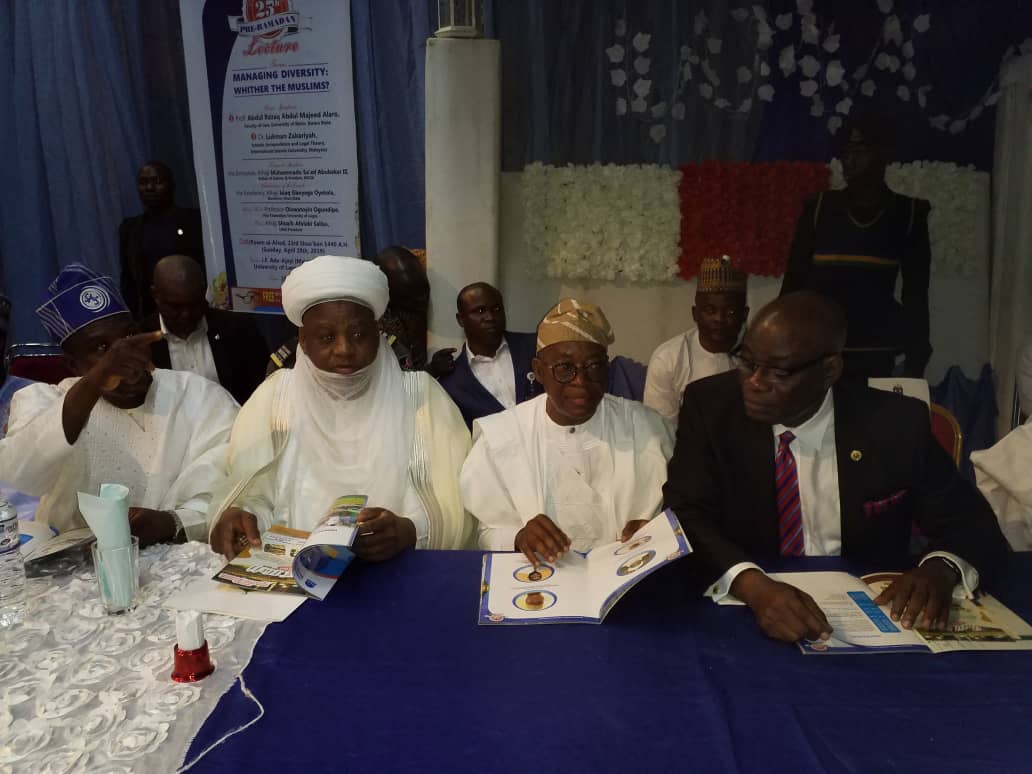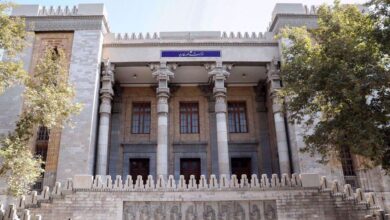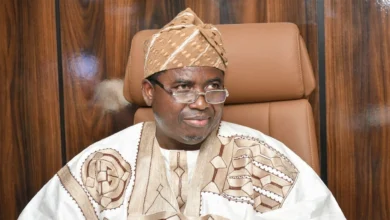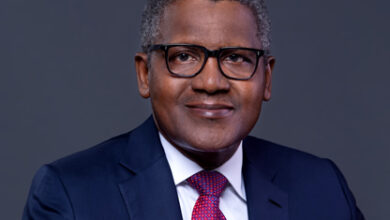Sultan Abubakar, Gov Oyetola, Alaro, Zakariya chart way to diversity management mechanism as UNILAG Muslim Alumni converges for 1440AH Pre-Ramadan Lecture

*If Muslims should be found wanting, not because of Islam but their ignorance of the religion – Sultan
*Alaro warns Muslim clerics, youths against arbitrary fatwa
*Muslims should bother on what unites, leave what disunites them – Dr. Zakariyah
By BASHIR ADEFAKA
Yawm al-Ahad 22 Sha’ban 1440AH equivalent to Sunday 28 April 2019 was another day planned and coming through for the dignitaries and other members of the Nigerian Ummah to advance, further more, the effort at consolidating the peace and development project not only for the faith community but, more extensively, Nigeria in general.

Leading the day was the Leader of the over 90 million Muslims of Nigeria and beyond, the Sultan of Sokoto, Alhaji Muhammad Sa’ad Abubakar, who delivered the keynote address at the lecture.
The Sultan, who described keynote as ‘key’ signifying opening, told his listeners that his role as keynote speaker was not to give lecture but provide an opening into the main discourse to be detailed by the two lecturers in the names of Prof. Abdul-Razaq Abdul-Majeed Alaro, a lawyer and professor of Law of University of Ilorin, and Dr. Lukman Zakariyah of the International Islamic University, Malaysia.
The Sultan in his Keynote address noted that Nigeria has no problem with diversity except that what the people of the country lack but which they must come by its embracement is managing the diversity, which he believes should be source of the country’s strength and economy growth, only if they know.
The Amirul Mu’mineen of Nigeria, who himself is a retired Army General, diplomat, and former Kwara State Football Association Administrator, said the Qur’an and the Hadeeth of Prophet Muhammad, peace of Allah be upon him, have provided the basis for Muslims on how to leave peacefully with people of other faiths, and essentially among themselves.
The Sultan said: “Prophet Muhammad (SAW) complemented this call to unity by weaving the fabric of brotherhood to further hold the Ummah together irrespective of what school of jurisprudence, or geographical location a Muslim might belong to.
“This serves as a strong motivation to prioritize the oneness of the community irrespective of those internal diversities in the Muslim community.”
The Amirul Mu’mineen justified his position by citing a Hadeeth of the Prophet as reported by Bukhari and Muslim saying: “A Muslim is a brother of (another) Muslim, he neither wrongs him nor does hand him over to someone who does him wrong. If anyone fulfills his brother’s needs, Allah will fulfill his needs; if someone relieves a Muslim of his troubles, Allah will relieve his troubles on the Day of Resurrection; and if anyone covers up a Muslim (his sin), Allah will cover up (his sin) on the Day of Resurrection.”

Moving forward, the Sultan said: “All these principles enunciated in the Qur’an and Sunnah are designed to equip the Muslims with the ability to live as global citizen, understanding these diversities for what they are and collaborating to build a peaceful world defined by justice and fairness.
“At the same time a Muslim, informed by these same principles, is able to fulfill his obligations to his Muslim community, strengthening its social fabric and accommodating and being considered to the other irrespective of his race, colour or religion.
“With all these, Muslims, more than any other group, are most equipped and should therefore be able to manage the diversity both within and without their communities. If they should be found wanting, it would not be because of Islam, but only because of their ignorance of their religion. Indeed this ignorance is today pervasive and represent one huge challenge that we have to address to enable us manage our diversity for the benefit of our various communities and indeed the world over.
“How exactly we do that, I leave in the competent of our scholars, one of whom we are today gathered here to listen to. May Allah the Most High guide us to that which is best, here and the hereafter,” the Sultan ended his keynote address at the 25th UNILAG Muslim Alumni Pre-Ramadan Lecture.
Alaro warns Muslim clerics, youths against arbitrary fatwa

Delivering his lecture, the first speaker, Prof. Abdul-Razaq Abdul-Majeed Alaro, who was scheduled to speak in Yoruba but having to code-mix, said: “We are a nation because of our diversity.”
Alaro went on to say that Allah says it is His sign that humanity should be diverse and so that diversity is not acquired here in the world but came with man from Allah. He said diversity, therefore, is not by accident or mistake but that Allah programmes humankind that way.
The University of Ilorin don said “Diversity is what we cannot avoid but must learn to live with and manage. We, by the design of Allah, have no such power as to change our diversity. It is ignorance and disbelief for people to blame or fault Nigeria’s amalgamation that brought all the tribes, languages, and the religions together, therefore because no matter how divided we are, we cannot stop indigenes of a settlement from continuing to be.
“Despite our diversity, we should accept it is Allah’s design that we live together and must learn to accommodate one another based on that understanding.”
At a point he paused and said: “We should ask ourselves some questions: Why are Yoruba of Nigeria not fighting Hausa of Ghana. What are Yoruba of Nigeria fighting Hausa of Northern Nigeria and vice versa? We should know from now that the reason is not farfetched. It is simply because Hausa of Nigeria are nearer to Yoruba of Nigeria than Hausa of Ghana, which means the simple reason we fight each other is because we live with one another and so can see the differences among ourselves whereas, it is the design of Allah those differences will be there without giving us the power to change them except that we exploit the diversity to advance the course of peace and development for ourselves as Nigerian people.”

Prof. Alaro particularly warned the Muslims not to fight one another over anything but urged them to refer to the Qur’an at all times whenever they have any difference.
“If then we know, let us ask: Why is this worrisome controversy of herdsmen/farmers happening? The Fulani that rears cows, who eats the cows? The farmer. Okay, the farmer that plants yam, maize, rice, pepper, tomatoes, and so on, who eat the yam and others? Fulani. It means that we live to complement one another because, against many think, Fulani is as important to the Yoruba and other tribes of Nigeria as each of the other tribes is important to the Fulani. Why then do we need to fight ourselves?” He asked.
The university don and lawyer however pointed out that there is a missing link which is causing the conflicts among the peoples of the country, particularly, Muslims.
“One thing is missing in the Muslim Ummah of Nigeria and I want to state this now that we have our Leader of the Ummah, the Sultan, on seat so that something can be done about it.”
Alaro then moved on to say that, “the thing that is missing in the Ummah is Alternative Dispute Resolution Mechanism. What is wrong if Imam of a Mosque is an arbitrator in disputes among his followers?”
He faulted the idea of Muslims taking dispute concerning themselves to court where people who lack the knowledge of Islamic jurisprudence sit and take stands on such cases which are contrary to the permissible of Islam.

He also warned Muslims disputing one another over differences of opinion saying “we cannot have difference of opinion over aqeedah but we can have on any other thing in matter of our religion. For one to now stand to say the other must take what he sees from his own perspective as part of religion, which is not seen by him, it is wrong and must be disallowed in the Ummah.”
Prof. Alaro expressed dismay that some Muslims particularly among youths, today believe that once they are called ‘Alfa’, Sheikh, they are now qualified to issue fatwa in Islam. He warned against the attitude saying faithful should be concerned with many things that bind them together, which unite them, and leave the one or few others which disunite and cause fight among them.
Like the Sultan, other dignitaries who gathered at the University of Lagos Main Auditorium on Sunday 28 April for the 25th Annual pre-Ramadan Lecture of the UNILAG Muslim Alumni Association (UMA) themed, “Managing Diversity: Whither The Muslims”, urged Nigerians to imbibe tolerance and peaceful co-existence.
They included Governor of State of Osun, Alhaji Isiaka Gboyega Oyetola; the Oba of Lagos, Oba Rilwanu Osuolale Akiolu I; the Vice Chancellor, University of Lagos, Prof. Oluwatoyin Ogundipe; Deputy President-General, Nigerian Supreme Council for Islamic Affairs (NSCIA) and President, Muslim Ummah of South West Nigeria (MUSWEN), Alhaji Sakariyau Olayiwola Babalola; Director, Muslim Rights Concern (MURIC), Prof. Ishaq Akintola, and , UMA National President and a host of others, hosted by UMA President, Alhaji Shuiab Afolabi Salisu.
Giving credence to the submissions were the Governor Oyetola and Oba Akiolu, who, like the Sultan, recollected how Prophet Muhammad, peace of Allah be upon him, fostered love and harmony among Muslims, Jews and Christians in Medina when he and his followers, as a result of persecution in Makkah, migrated to the new City of Medina.
Governor Oyetola speaks

Governor Oyetola, who in his speech expressed joy to be a Muslim alumni of University of Lagos, said it was gratifying seeing strong Muslim associations for students and alumni alike which are critical communities to keep members grounded in their faith and serve as a reminder of their obligations to Allah, fellow human beings and the rest of creation.
The governor said: “I shall remain grateful for the opportunity UNILAG has given me. I recall with nostalgia that the Jumat Mosque we left here as our set exited in 1978, was neither a tenth nor as big or as beautiful and magnificent as the one we have now. Alhamdulillah!”
Speaking on the theme, the State of Osun governor said: “Today’s topic, Managing Diversity: Wither the Muslims? is a subject of grave spiritual importance and one that demands intellectual rigour and a deep understanding of tolerance in the face of diversity and differences.”
He said: “Allah has created multitudes where each individual or creature or phenomenon is unique in and of itself. It is this same diversity we mean when we say Nigeria is a multiethnic nation.
“The earth is populated by a beautifully diverse array of disciplines and human endeavors including, law, medicine, nursing, engineering, Political Science, Sociology and a host of others that see the world from a different perspective. This is what university education taught us – to fit into the world which Allah has created with inherent diversity.
“Unfortunately, we engage in the negativity of intolerance in diversity, hence we have Xenophobia, ethnic and religious chauvinism, which is often wrapped around religion to justify these evil and un-Islamic positions. We all know that negative theological impulses emphasize mostly on what you can’t do or shouldn’t do rather than what you should love to do for Allah and for your fellow man for a mutually beneficial co-existence. These negative and exclusive impulses are not inherent to Islamic traditions as some scholars with a narrow perspective of the world will rather make us believe.
“Hate and extremism, therefore, is not intrinsic to Islam and was never a part of our spiritual DNA. If we are to promote diversity, we must chain this beast called extremism.

“In Nigeria, thousands have lost their lives to mindless nihilistic violence perpetrated by Boko Haram, who are simple bandits parading themselves to be Muslims. Again in another clime -The white supremacist zealot-Brenton Tarrant shocked the world when he gunned down 50 Muslims from diverse backgrounds and countries in cold blood as they prayed in Mosques in New Zealand just a few weeks ago, and about 25 years before Tarrant went on his rampage, in the very year this Ramadan lecture started, one Baruch Goldstein, a Jewish zealot, gunned down Palestinian Muslim worshippers killing 29 and wounding 125 on February 25th, 1994.
“We must therefore call out governments engaged in discriminatory policies that promote extremism as we call out extremists engaged in violence. I am a Governor today of the State Of Osun, ruling over Millions of Muslims, Christians and traditional worshippers. I owe them all fairness, justice without discrimination while affirming the diversity that Allah the creator of the world has entrenched within his creations.
“We should note today that we Muslims are well placed to lead change against such noxious perceptions.”
Delivering his welcome address earlier, UMA President Salisu said the theme was specially selected by the group in view of the prevailing situation of religious and ethnic tension in Nigeria and the world over.
The Vice Chancellor of University of Lagos, Prof. Oluwatoyin Ogundipe, a Christian, praised the Muslim Alumni Association, which announced it had so far produced 156 scholars on the range of undergraduate and postgraduate, for its efforts at charting pathways for the peace and progress of the nation and for being worthy ambassadors of the University.
He recalled with nostalgia his growing up days in Lagos during which he said Christians and Muslims co-existed peacefully and felicitated together during their different religious festivities, praying for the return of “the good old days.”











